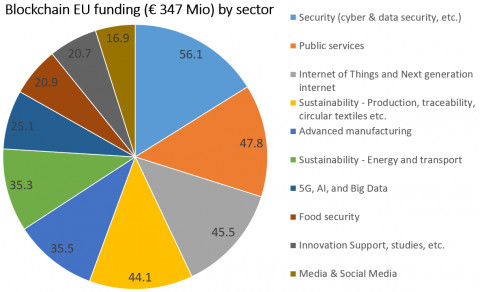Nations Race to Support Blockchain Innovation and Adoption Via Comprehensive Strategies, Regulatory Frameworks, and Funding


In Brief
Governments worldwide are promoting blockchain growth through public sector initiatives, supporting innovation, and developing regulatory frameworks, with notable projects from the Middle East, Asia-Pacific, North America, and the European Union.
Governments everywhere are seeing the promise of blockchain and stepping in to encourage its growth and use. The public sector is in charge of advancing this technology, from supporting innovation to developing national plans and regulatory frameworks. This article examines the notable blockchain projects and initiatives from the Middle East, Asia-Pacific, North America, and the European Union.
European Union
In terms of investment, legislation, and policy around blockchain, the European Union has come to the fore. At the regional and national levels, blockchain has been recognized as an important technology that requires targeted resources and strategic support.
Financial services, supply chain traceability, digital identities, and blockchain governance have already received over €340 million in funding. European Blockchain Pre-Commercial Procurement, BlockCIS for customs operations, Blocker for bloXroute blockchain scalability, and INTERCOR for anti-corruption applications are a few notable initiatives supported by the EU.

Photo: European Commission
The European Commission, the European Blockchain Observatory and Forum, and representatives from thirty nations make up the European Blockchain Partnership (EBP). In order to prevent fragmented approaches, this collaborative group seeks to construct an EU blockchain services infrastructure (EBSI), set interoperability norms, and exchange expertise.
Additionally, the EU has taken the lead in creating thorough regulations for financial services based on blockchain and cryptocurrency assets. The Markets in Crypto-Assets (MiCA) regulatory framework was agreed upon in 2022 following much discussion. While permitting compliant crypto issuers and service providers to receive an EU “regulation passport” for pan-European operations, MiCA will apply stringent operational criteria and safeguards for consumers.
Despite being already innovative for the EU, MiCA’s influence may go much beyond Europe as other countries consider implementing some of its regulatory frameworks. MiCA, an original framework from a major economic bloc, has the potential to profoundly influence how decentralized finance (DeFi) develops globally in the future.
Additionally, certain EU members are actively promoting blockchain innovation.
Italy
In order to support businesses creating blockchain, AI, and IoT solutions for industries including manufacturing, tourism, aerospace, and health, Italy established a €45 million fund in 2022. The Italian securities regulator has shown support for blockchain-based financing by allowing the operation of major cryptocurrency exchanges like Binance.
France
In addition to passing crypto-friendly laws in 2019, France has used grants and the French Tech Sovereignty fund to finance a number of national blockchain initiatives. Blockchain-based digital ID credentials were created by the EU-funded UNICORN project, and PVDF-CLOUD is developing blockchain tools for supply chain transparency.
Germany
Germany oversees the European Blockchain Institute, which provides guidance to the government and business and has spent over €24 million in blockchain research. Notable initiatives include the digital euro trials conducted by the Bundesbank, the blockchain-based smuggler monitoring system developed by Interpol, and the blockchain-based passport developed by BMW.
North America
Public sector blockchain efforts in North America are more distributed among several federal departments and levels of government, in contrast to Europe’s more centralized and coherent approach.
United States
The U.S. federal government has adopted a more dispersed strategy centered on comprehending particular use cases and applications across many departments, rather than having an overall national blockchain strategy. Nonetheless, a number of financial initiatives have aided in the blockchain innovation of the private sector.
Numerous blockchain businesses have received contracts and grants from the STTR and SBIR programs. For instance, the Department of Homeland Security’s Silicon Valley Innovation Program has made investments in many blockchain businesses that are creating products for supply chain monitoring, credential issuing, and other uses.
Colorado was among the first in this regard, offering crypto companies legal exemptions and removing the need for security for some consumer blockchain tokens. In an effort to draw firms, Wyoming has adopted over 20 blockchain legislation in a similarly inviting manner. Other states that are open to blockchain technology are Nevada, Delaware, and Vermont.
Canada
Blockchain technology is seen by the Canadian government as a strategic tool that might have long-term positive effects on the economy and society. However, in comparison to other developed economies, public sector blockchain efforts are still rather small.
With programs like the $190 million Pan-Canadian Artificial Intelligence Strategy, which funds university laboratories and blockchain research centers, the government has mostly concentrated on exploratory research operations. Blockchain experiments have been carried out by federal authorities in domains such as public procurement platforms and government service delivery.
Based on signals from the leadership, bigger national efforts and policies could be ahead. The government of Canada has designated blockchain, cryptocurrency, and decentralized finance as sectors that require regulatory reform in the 2022 Canadian Budget in order to promote development and international competitiveness. A new Canadian Digital Currencies Act is to be established, according to the budget, in order to stimulate financial technology innovation and reduce risks.
Canadian Toronto and Calgary have commissioned blockchain plans and roadmaps at the municipal level in order to create frameworks that facilitate local economic innovation.
Overall, although progress is being made, Canada’s public sector does not yet have the strategic adoption plans and large-scale blockchain investment that other global centers, such as the European Union, Australia, and several parts of Asia, possess.
Asia-Pacific
China
China is perhaps the nation that has made the largest strategic wager on blockchain technology. China is actively pursuing blockchain development as a state priority, having quickly seen the potential of its decentralized architecture despite the concentration of global technical power.
The Blockchain Service Network (BSN), a national infrastructure that offers inexpensive cloud resources, tools, and assistance for developers to create and manage blockchain applications, is China’s most prominent blockchain initiative. The BSN, which was first suggested in 2016 and has been financed by the State Information Center with over $500 million, is essentially a blockchain cloud operating system that spans data centers all across China.
BSN seeks to promote widespread industry use and expedite the adoption of commercial blockchain. The BSN’s cloud architecture, which enables public and permissioned chains like Ethereum, Corda, and bespoke networks, is essential to realizing this ambition. In 2020, the BSN debuted nationally and is now working toward worldwide growth.
Middle East
Dubai’s Blockchain Strategy
As part of its goal to become the world’s center of technical innovation, the city of Dubai is spearheading some of the most ambitious national blockchain initiatives. The United Arab Emirates has become a hotspot for blockchain technology.
Presented in 2018, the Dubai Blockchain Strategy is one of the biggest and most proactive governmental blockchain initiatives to date. By 2021, the objective is to establish Dubai as the world’s first blockchain-powered government.
The comprehensive approach includes more than 20 application examples in eight industrial sectors:
- Legal system;
- Transport;
- Infrastructure, energy, and healthcare;
- Digital records and nationality;
- Tourism;
- Commercial and real estate deals;
- E-commerce and retail.
Authorities in Dubai project that the plan, which makes use of blockchain technology, may result in yearly savings of more than $3 billion in operating expenses and economic production.
Apart from cutting expenses, the blockchain approach fits with Dubai’s overarching goal of utilizing new technologies to improve social services, environmental sustainability, economic competitiveness, and the general standard of living for its residents. The government emphasized how blockchain can promote social inclusion, democratic involvement, and supply chain transparency and traceability.
The Dubai Blockchain Strategy is quite ambitious in scope, but it is not limited to theoretical research; it is also practical in application. Several engagement reports detailing particular pilot initiatives, collaborations, and legal considerations that are necessary to progressively progress the strategy throughout all eight industrial verticals have been released by the Smart Dubai Office.
Fintech ambitions encompass, among other things, the creation of a payment system based on decentralized ledger and the issuance of inaugural blockchain tokens. Use cases for real estate include utilizing blockchain tokens to facilitate fractional ownership of properties and expediting title transfers to do away with middlemen. Blockchain is being used in transportation to optimize pricing schemes for traffic congestion and manage paperwork related to the lifespan of vehicles.
The authorities of Dubai have developed supporting blockchain policy frameworks to facilitate adoption. These frameworks include an overall blockchain statute as well as supplemental recommendations for different uses such as crypto assets, data protection, and digital signatures. Additionally, an ecosystem of corporate and startup partners is being developed.
Disclaimer
In line with the Trust Project guidelines, please note that the information provided on this page is not intended to be and should not be interpreted as legal, tax, investment, financial, or any other form of advice. It is important to only invest what you can afford to lose and to seek independent financial advice if you have any doubts. For further information, we suggest referring to the terms and conditions as well as the help and support pages provided by the issuer or advertiser. MetaversePost is committed to accurate, unbiased reporting, but market conditions are subject to change without notice.
About The Author
Victoria is a writer on a variety of technology topics including Web3.0, AI and cryptocurrencies. Her extensive experience allows her to write insightful articles for the wider audience.
More articles

Victoria is a writer on a variety of technology topics including Web3.0, AI and cryptocurrencies. Her extensive experience allows her to write insightful articles for the wider audience.


















































